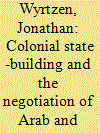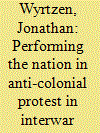| Srl | Item |
| 1 |
ID:
104154


|
|
|
|
|
| Publication |
2011.
|
| Summary/Abstract |
Colonial state-building in Protectorate Morocco, particularly the total "pacification" of territory and infrastructural development carried out between 1907 and 1934, dramatically transformed the social and political context in which collective identity was imagined in Moroccan society. Prior scholarship has highlighted the struggle between colonial administrators and urban Arabophone nationalist elites over Arab and Berber ethnic classifications used by French officials to make Moroccan society legible in the wake of conquest. This study turns to the understudied question of how rural, tribal communities responded to state- and nation-building processes, drawing on a unique collection of Tamazight (Berber) poetry gathered in the Atlas Mountains to illuminate the multiple levels on which their sense of group identity was negotiated. While studies of identity in the interwar Arab world have concentrated on how Pan-Islamism, Pan-Arabism, and local nationalisms functioned in the Arab East, this article changes the angle of analysis, beginning instead at the margins of the Arab West to explore interactions between the consolidation of nation-sized political units and multivocal efforts to reframe the religious and ethnic parameters of communal solidarity during the colonial period.
|
|
|
|
|
|
|
|
|
|
|
|
|
|
|
|
| 2 |
ID:
123124


|
|
|
|
|
| Publication |
2013.
|
| Summary/Abstract |
This article applies a process approach to the study of nationalism, analysing anti-colonial protest in interwar Morocco to address how and why elite-constructed national identity resonates for larger audiences. Using Alexander's social performance model to study nationalist contention, it examines how a Muslim prayer ritual was re-purposed by Moroccan nationalists to galvanise mass protest against a French divide-and-rule colonial policy towards Moroccan Berbers that they believed threatened Morocco's ethno-religious national unity. By looking at how national identity was forged in the context of contentious performances and why certain religious (Islam) and ethnic (Arab) components were drawn on to define the Moroccan nation, this study offers a model for answering why national identity gets defined in specific ways and how the nation gains salience for broader publics as a category of collective identity.
|
|
|
|
|
|
|
|
|
|
|
|
|
|
|
|